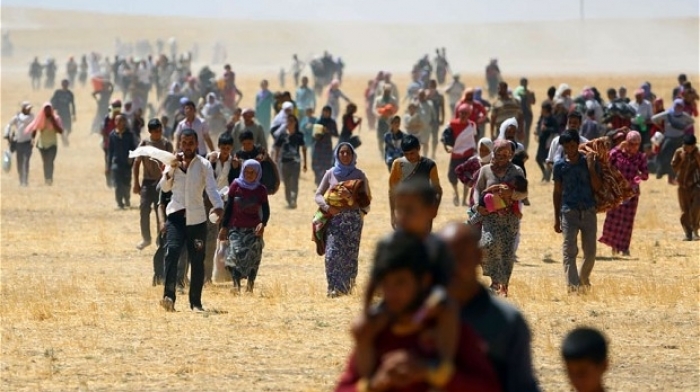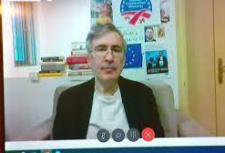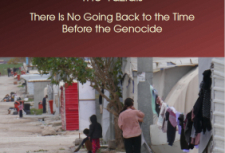As a survivor of a genocide, it is so difficult to sleep

After the group left them alone, they broke the door and escaped through the back of the camp. Then he made it to the UK, in a lorry, inside a small storage box, which he says could only have comfortably fit a child. He emptied it, got in and taped it again from the inside. I still have pain in my knee and my shoulder- he says. After 16 hours in the lorry Majhor made it to the UK, where he has been ever since November 2016.
The Home Office stated 15 reasons for rejecting his application, claiming he could go and live in the Iraqi cities of Basra and Baghdad, or in other countries. He mentions how, before the war, Shingal was 90 per cent Yezidi and only 10 per cent Muslim. During the attack the 10 percent joined Isis, and they attacked us. So how can it be possible for me to live in a community which is a hundred per cent Muslim? It is impossible, at least psychologically.
As a survivor of the genocide it is so difficult even to sleep. You relive the genocide every single night, and how we lost our people. Psychologically it is so damaging, said Majhor.
Before, Majhor was surprised by the lack of intervention from Western Countries while Isis invaded his city. They have huge power, all of these armies, aeroplanes they havent even tried to help those women being captured by Isis,-he comments. Now he feels disappointed once more by the lack of UK government support for his people. He finds it sad that the government gives money to the Kurdistan regional government and the Iraqi government to protect Yezidis, instead of dealing directly with the Yezidi people. Not even the UK government believes the Yezidis should run their own lives, Majhor exclaims.
I would like the British Government to listen to the people who were persecuted by Isis and had to flee. To me, it seems they dont believe the victims, he adds, reflecting on his own situation after the UK Home Office refused his asylum claim.
Mahjor has been homeless and is not allowed to work. For him there is not much difference between the way the British and Iraqi governments have treated him. But, he says the people in the UK are really nice. You can find thousands like Anne. He is talking about Anne Norona, manager of the Yezidi Emergency Support charity, which helps displaced Yezidis in the Middle East and Europe. Majhor considers that the people in the UK are lovely and helpful. He thinks ordinary people, not the government, represent the real face of the UK.
After two and a half years in the UK, Majhor thinks he has found some stability and safety, and has achieved some of his aims. But he doesnt forget how difficult the government makes it for him. I have suffered a lot in the UK. I was nearly ready to commit suicide and if Anne hadnt found me I probably wouldnt be here to say this now.Majhor has lost faith in the commitment of Western governments to human rights. To him the question is: if the British government doesnt even give Yezidis protection here in the UK, how can Yezidis be protected in Iraq?
It has been a year since the Home Office refused Majhor first asylum claim and told him he was no longer entitled to state support. After Anne Norona opened her door to Majhor, saying he could stay with her until they found a solution, he found a solicitor and made a new asylum claim. Nearly ten months later, he is still waiting for the Home Office to respond. He fears being turned down again and is worried that deportation will be one of the possible options.
According to Norona, asylum-seekers such as Majhor are at the mercy of an overstretched immigration system. They are not only genocide victims but victims of our increasingly hostile anti-immigration system,-she tells me. The courts and the Home Office seem to have little insight into the suffering, or the oppression and systemic persecution.
Mahjor is now waiting for his last asylum interview, which will be in July. I am not allowed to work or study, I am suffering a lot psychologically, he says. I constantly think about what happened, and the Isis attack. Im reliving the situation every day because Im just sitting here, doing nothing.
Tags:
As a survivor of a genocide, it is so difficult to sleep

After the group left them alone, they broke the door and escaped through the back of the camp. Then he made it to the UK, in a lorry, inside a small storage box, which he says could only have comfortably fit a child. He emptied it, got in and taped it again from the inside. I still have pain in my knee and my shoulder- he says. After 16 hours in the lorry Majhor made it to the UK, where he has been ever since November 2016.
The Home Office stated 15 reasons for rejecting his application, claiming he could go and live in the Iraqi cities of Basra and Baghdad, or in other countries. He mentions how, before the war, Shingal was 90 per cent Yezidi and only 10 per cent Muslim. During the attack the 10 percent joined Isis, and they attacked us. So how can it be possible for me to live in a community which is a hundred per cent Muslim? It is impossible, at least psychologically.
As a survivor of the genocide it is so difficult even to sleep. You relive the genocide every single night, and how we lost our people. Psychologically it is so damaging, said Majhor.
Before, Majhor was surprised by the lack of intervention from Western Countries while Isis invaded his city. They have huge power, all of these armies, aeroplanes they havent even tried to help those women being captured by Isis,-he comments. Now he feels disappointed once more by the lack of UK government support for his people. He finds it sad that the government gives money to the Kurdistan regional government and the Iraqi government to protect Yezidis, instead of dealing directly with the Yezidi people. Not even the UK government believes the Yezidis should run their own lives, Majhor exclaims.
I would like the British Government to listen to the people who were persecuted by Isis and had to flee. To me, it seems they dont believe the victims, he adds, reflecting on his own situation after the UK Home Office refused his asylum claim.
Mahjor has been homeless and is not allowed to work. For him there is not much difference between the way the British and Iraqi governments have treated him. But, he says the people in the UK are really nice. You can find thousands like Anne. He is talking about Anne Norona, manager of the Yezidi Emergency Support charity, which helps displaced Yezidis in the Middle East and Europe. Majhor considers that the people in the UK are lovely and helpful. He thinks ordinary people, not the government, represent the real face of the UK.
After two and a half years in the UK, Majhor thinks he has found some stability and safety, and has achieved some of his aims. But he doesnt forget how difficult the government makes it for him. I have suffered a lot in the UK. I was nearly ready to commit suicide and if Anne hadnt found me I probably wouldnt be here to say this now.Majhor has lost faith in the commitment of Western governments to human rights. To him the question is: if the British government doesnt even give Yezidis protection here in the UK, how can Yezidis be protected in Iraq?
It has been a year since the Home Office refused Majhor first asylum claim and told him he was no longer entitled to state support. After Anne Norona opened her door to Majhor, saying he could stay with her until they found a solution, he found a solicitor and made a new asylum claim. Nearly ten months later, he is still waiting for the Home Office to respond. He fears being turned down again and is worried that deportation will be one of the possible options.
According to Norona, asylum-seekers such as Majhor are at the mercy of an overstretched immigration system. They are not only genocide victims but victims of our increasingly hostile anti-immigration system,-she tells me. The courts and the Home Office seem to have little insight into the suffering, or the oppression and systemic persecution.
Mahjor is now waiting for his last asylum interview, which will be in July. I am not allowed to work or study, I am suffering a lot psychologically, he says. I constantly think about what happened, and the Isis attack. Im reliving the situation every day because Im just sitting here, doing nothing.
Tags:

























